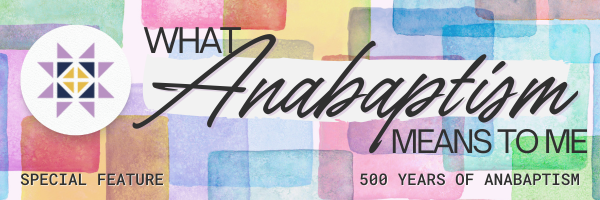As Mosaic Mennonite Conference commemorates the 500th Anniversary of Anabaptism in 2025, each month we will share a variety of Mosaic voices reflecting on the question, “What does Anabaptism mean to me?”


Submission from
John L. Ruth, Salford (PA) congregation
I understand baptism to be a sacramental act of accepting God’s forgiveness, God’s renewal of my heart, and entrance into God’s covenant of reconciliation.
The ancient term “Anabaptist” (rebaptizer) is a kind of misnomer. The people in my 16th Century-formed fellowship considered themselves to be baptized only once, since they concluded that a ritual on behalf of uncomprehending infants was not what the New Testament teaches. Thus, though most had received the rite common throughout medieval Christendom, they did not view their conscious baptism of repentance as a second one.
As the oversimplified term “Anabaptist” became common parlance, it is historically useful. But it fails to convey ideas that are just as definitive as baptism to the spiritual / social breakthrough that focused my Mennonite people’s understanding: (1) following “the Word” to (2) covenant or “form a church” in which (3) the use of force is replaced by the loving way Jesus described in the “Sermon on the Mount.” Since many Anabaptists of the 16th Century did not “give up the sword,” it is to the testimony and suffering of the minority who did that I look for my inspiration and model of church.

Submission from
Maati Yvonne Platts, Mosaic Conference Board Member, Nueva Vida Norristown (PA) New Life
What it Means to be Black and Anabaptist
Anabaptism to me means being baptized by my Black preacher Hubert Brown on Easter Sunday, April 14, 1968 when I was ten. It meant what was important in the church was important in the community and what was important in the community was important in the church.
It meant Brother Markley knocking at ya door when you done missed church a few Sundays in a row. Baking chocolate, fresh mint tea, and hot blueberry pies at summer camp.
It means fellowship meals and cherry cheese pies from my sister Betty (no shoe-fly pie for me).
It means loving our brothers and sisters as ourselves: red, brown, yellow, white, or black we are all precious in God’s sight.
It means a love that was real, serving a God that was real, who cares about community, there was real love and unity, ministry over business, taking care of the poor as well as those in prison.
It means a heart of gratitude for other Anabaptists that see your ugly and your beauty and love you still.
It means a heart of forgiveness for those who have hurt you and walking closer with the spirit of humility as you grow old, and patience grows thin.
Anabaptism means departing from evil to do good; to seek peace and pursue it.
What Anabaptism means to me is to live free in what Jesus has called me to be, to show love even when others aren’t loving, to stand up and speak out against injustice, yet have compassion for those that hearts and minds just ain’t right.
It ain’t about being Anabaptist, it’s about the love of Jesus in me.

Submission from
Bishop Juan Marerro, Executive Director of Conference-Related Crossroads Community Center (Philadelphia, PA)
What does Anabaptism mean to me?
These early believers, whose theology and philosophy of ministry that we current Anabaptists descend from, had the heart and conviction to follow what they were convinced was the leading and moving of the Holy Spirit.
These early believers were radical enough to follow what they saw on the pages of sacred scripture and quickly developed a Christ-centered theology and philosophy of ministry. These Anabaptists, as they were called, held on to the practice of believer’s baptism despite opposition and persecution. Despite drownings and burnings, they pushed on, following the example of Jesus Christ and his apostles. This gives me encouragement to continue in this radical faith and push on despite the opposition we may face as believers in Christ.
The opinions expressed in articles posted on Mosaic’s website are those of the author and may not reflect the official policy of Mosaic Conference. Mosaic is a large conference, crossing ethnicities, geographies, generations, theologies, and politics. Each person can only speak for themselves; no one can represent “the conference.” May God give us the grace to hear what the Spirit is speaking to us through people with whom we disagree and the humility and courage to love one another even when those disagreements can’t be bridged.
